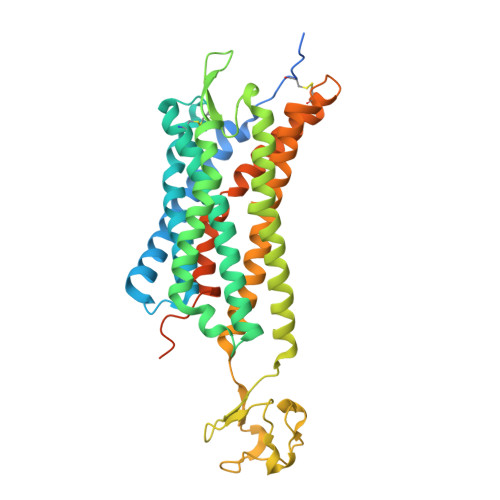Two disparate ligand-binding sites in the human P2Y1 receptor
Zhang, D., Gao, Z.G., Zhang, K., Kiselev, E., Crane, S., Wang, J., Paoletta, S., Yi, C., Ma, L., Zhang, W., Han, G.W., Liu, H., Cherezov, V., Katritch, V., Jiang, H., Stevens, R.C., Jacobson, K.A., Zhao, Q., Wu, B.(2015) Nature 520: 317-321
- PubMed: 25822790
- DOI: https://doi.org/10.1038/nature14287
- Primary Citation of Related Structures:
4XNV, 4XNW - PubMed Abstract:
In response to adenosine 5'-diphosphate, the P2Y1 receptor (P2Y1R) facilitates platelet aggregation, and thus serves as an important antithrombotic drug target. Here we report the crystal structures of the human P2Y1R in complex with a nucleotide antagonist MRS2500 at 2.7 Å resolution, and with a non-nucleotide antagonist BPTU at 2.2 Å resolution. The structures reveal two distinct ligand-binding sites, providing atomic details of P2Y1R's unique ligand-binding modes. MRS2500 recognizes a binding site within the seven transmembrane bundle of P2Y1R, which is different in shape and location from the nucleotide binding site in the previously determined structure of P2Y12R, representative of another P2YR subfamily. BPTU binds to an allosteric pocket on the external receptor interface with the lipid bilayer, making it the first structurally characterized selective G-protein-coupled receptor (GPCR) ligand located entirely outside of the helical bundle. These high-resolution insights into P2Y1R should enable discovery of new orthosteric and allosteric antithrombotic drugs with reduced adverse effects.
Organizational Affiliation:
CAS Key Laboratory of Receptor Research, Shanghai Institute of Materia Medica, Chinese Academy of Sciences, 555 Zuchongzhi Road, Pudong, Shanghai 201203, China.
















